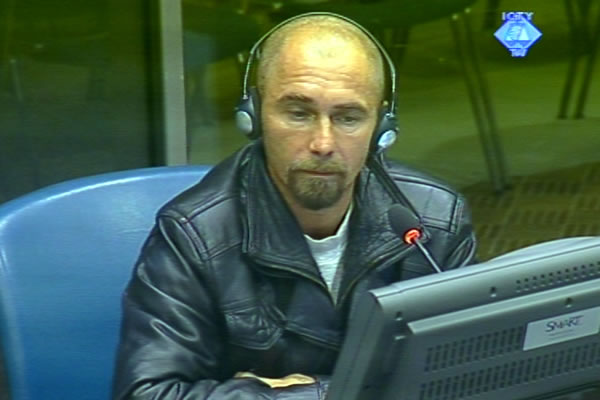Home
‘THERAPY SESSIONS’ IN DALJ PRISON
Zlatko Antunovic, the first witness at the trial of Goran Hadzic, has described his detention in the Culture Hall in Dalj and Arkan’s training center in Erdut. He also described the nighttime visits to the cells by the prison guards who would take prisoners out for ‘therapy sessions’
 Zlatko Antunovic, witness at the Goran Hadzic trial
Zlatko Antunovic, witness at the Goran Hadzic trial Zlatko Antunovic nicknamed Kepa is the first witness at the trial of Goran Hadzic. He testifies about the ordeal in various detention facilities in Dalj and Erdut in the second half of 1991. At that time, Hadzic was prime minister of the Serbian Autonomous Region of Eastern Slavonia, Baranja and Western Srem. The indictment charges him with crimes in Dalj and Erdut.
Antunovic first described the attack on the police station in Dalj on 1 August 1991 and the arrival of JNA tanks. He was arrested a few days later and taken to a make-shift prison in the Culture Hall in Dalj. He was assured they would ‘not harm a hair on my head’. He was interrogated by the ‘head policeman’ in plainclothes, Zeljko Cizmic, about the HDZ, the number of Croats in Erdut, about weapons and his brother’s whereabouts. He was moved to a cell in which he found five or six men. One of them had visibly been beaten as he was black and blue and his lips were bloody.
The witness described how ‘Serb guards’ would enter the room at night, shining their lights on prisoners who would then be taken out for ‘therapy sessions’. ‘Moans full of pain’ would be heard, and some of those who had been taken out never returned. Two volunteers from Serbia, one of whom was nicknamed Ferenc Madjar, beat the witness with their batons on bare soles. They also forced him to dive into the basement which had been flooded and to wash a toilet in the yard with his bare hands. He had to smear the excrement on some bread and eat it. After a while, he was released.
Antunovic went back to work in the agricultural complex, but was rearrested in October 1991, and taken to the Culture Hall in Dalj. En route, he was told, ‘look at Erdut for the last time because you won’t see it again’. He was interrogated again, this time by Milorad Stricevic, who acted as if he were the prison warden. Arkan attended one of the interrogation sessions. He ordered the witness to lie down and to write in the Cyrillic alphabet the names of all the Croats who remained in Erdut. As the witness did that, one of Arkan’s men, ‘a big guy, weighing over a hundred kilos’ trod on the witness’s back. In the next 15 days, the witness was beaten on a daily basis by civilians and soldiers alike; they hit him with batons and thick cables, pulled his hair and the like. They would order him to sing Croatian songs and then they would ‘kick me and throw me around like a sack’.
As he had the HDZ emblem tattooed on his arm, a guard nicknamed Madjar threatened he would cut off his arm unless he erased the tattoo. The witness used cigarettes to burn off the tattoo, day and night. As he remarked, he did a good job because ‘my arm is still here’. During his detention, he was made to work in the houses of the guards in the Culture Hall.
Antunovic was arrested for the third time on 25 December 1991, two days after his 18th birthday and was taken to Arkan’s HQ in Erdut. As he claimed, an old lady was beaten up in the HQ because she had put up a Christmas tree in her home. All the Croats from Erdut, including the witness and all his relatives, were expelled from their homes and had to go to Osijek in April 1992. He did not return to Erdut until 2003.
In a brief cross-examination, Hadzic’s lawyer insisted mostly on learning what had motivated the witness to get an HDZ tattoo on his arm, and to join the youth organization of the party. As Antunovic said, he did not attend the HDZ meetings or rallies, and he did not know what the youth organization had been doing. He couldn’t tell why he had decided to have the tattoo. ‘When you’re young you do crazy stuff’, he said, adding that he had not been into politics then and he was not into it now. The defense counsel showed the witness a document in which Tomislav Mercep talks about the establishment of a military wing in the HDZ and the organization of weapons training. Antunovic had no knowledge of that.
The trial of Goran Hadzic for crimes against humanity and violations of laws and customs of war in Eastern Slavonia continues tomorrow with the evidence of a new prosecution witness.
Linked Reports
- Case : Hadzic
- 2012-10-16 TRIBUNAL'S LAST TRIAL BEGINS
- 2012-10-15 FINAL PREPARATIONS FOR HADZIC TRIAL COMPLETED
- 2012-09-13 GORAN HADZIC’S TRIAL TO OPEN ON 16 OCTOBER
- 2012-10-18 HOW HADZIC DECIDED TO GO TO WAR WITH CROATS
- 2012-10-19 ‘NO CONDITIONS FOR RETURN, BUT NO EFFORT TO PUT THEM IN PLACE’
- 2012-10-22 DZAKULA: 'SERBS' COMMITMENT TO WAR BENEFITED CROATIA'
